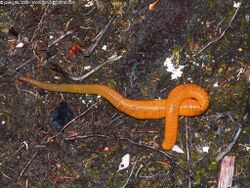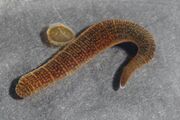Biology:Arhynchobdellida
| Proboscisless leeches | |
|---|---|

| |
| A giant Americobdella species from southern Chile. | |
| Scientific classification | |
| Domain: | Eukaryota |
| Kingdom: | Animalia |
| Phylum: | Annelida |
| Class: | Clitellata |
| Subclass: | Hirudinea |
| Infraclass: | Euhirudinea |
| Order: | Arhynchobdellida Blanchard, 1894 |
| Suborders | |
|
Erpobdelliformes | |
| Synonyms | |
|
Arhynchobdellae Stuart, 1982[verification needed] | |
Arhynchobdellida, the proboscisless leeches, are a monophyletic order of leeches. They are defined by the lack of the protrusible proboscis that defines their sister taxon, the Rhynchobdellida.[1][2][3] Arhynchobdellida is a diverse order, compromising both aquatic and terrestrial, besides sanguivorous and predatory, leeches.[3] The order is divided into two suborders, Erpobdelliformes and Hirudiniformes (sometimes also called the Pharyngobdelliformes and Gnathobdelliformes, respectively).[1]
Taxonomy
Historically, the Arhynchobdellida were split into two orders, the Gnathobdellida and the Pharyngobdellida.[4] The Gnathobdellida were jawed and carnivorous or parasitic while the Pharyngobdellida were jawless and carnivorous.[5][6] Current taxonomy accepts the order Arhynchobdellida and divides into two suborders. There are 215 species of Arhynchobdellid leech, in 47 genera and 13 families.[7] The placement of Americobdellidae is uncertain; it has rudimentary jaws and is terrestrial.

Erpobdelliformes
Erpobdelliformes are jawless predators of aquatic invertebrates of varying sizes, including insect larvae, mollusks, and other annelids.[8][9] Unlike other leeches, they do not penetrate the skin of hosts; and are not at all parasitic.[10][11] The pharynx is spirally twisted and very large to allow for large prey; it can constitute up to one third of the leech's body length.[1]
Hirudiniformes
Hirudiniformes are a diverse suborder defined by the presence of toothed jaws.[1][11]
Cladogram
| Hirudinea |
| ||||||||||||||||||||||||||||||||||||||||||
Source:[12]
References
- ↑ 1.0 1.1 1.2 1.3 Ax, Peter (2000), Ax, Peter, ed., "Rhynchobdellida — Arhynchobdellida" (in en), Multicellular Animals: The Phylogenetic System of the Metazoa. Volume II (Berlin, Heidelberg: Springer): pp. 72–76, doi:10.1007/978-3-662-10396-8_18, ISBN 978-3-662-10396-8, https://doi.org/10.1007/978-3-662-10396-8_18, retrieved 2022-12-31
- ↑ Ecology, Environment and Conservation. EM International, Publishers of Quality International Journals. doi:10.53550/eec. http://dx.doi.org/10.53550/eec.
- ↑ 3.0 3.1 Uttam, Suneha, and Seema Langer. "Distribution and Identification key for species of freshwater leech genus Erpobdella Blainville, 1818 (Hirudinida: Arhynchobdellida: Erpobdelliformes: Erpobdellidae)."
- ↑ "PAR volume 94 issue 1 Cover and Back matter" (in en). Parasitology 94 (1): b1–b3. Feb 1987. doi:10.1017/S0031182000053385. ISSN 1469-8161.
- ↑ "Pharyngobdellida | Encyclopedia.com". https://www.encyclopedia.com/science/dictionaries-thesauruses-pictures-and-press-releases/pharyngobdellida.
- ↑ "Gnathobdellida | Encyclopedia.com". https://www.encyclopedia.com/science/dictionaries-thesauruses-pictures-and-press-releases/gnathobdellida.
- ↑ "Proboscisless leeches - Encyclopedia of Life". https://www.eol.org/pages/40.
- ↑ Kwak, Hee-Jin; Kim, Jung-Hyeuk; Kim, Joo-Young; Jeon, Donggu; Lee, Doo-Hyung; Yoo, Shinja; Kim, Jung; Eyun, Seong-il et al. (2021-05-25). "Behavioral variation according to feeding organ diversification in glossiphoniid leeches (Phylum: Annelida)" (in en). Scientific Reports 11 (1): 10940. doi:10.1038/s41598-021-90421-1. ISSN 2045-2322. PMID 34035418.
- ↑ "Phylogeny and Revision of Erpobdelliformes (Annelida, Arhynchobdellida) from Mexico Based on Nuclear and Mithochondrial Gene Sequences". https://docslib.org/doc/812305/phylogeny-and-revision-of-erpobdelliformes-annelida-arhynchobdellida-from-mexico-based-on-nuclear-and-mithochondrial-gene-sequences.
- ↑ Kutschera, U. "Description of a new leech species, Erpobdella wuttkei nov. sp.(Hirudinea: Erpobdellidae)."
- ↑ 11.0 11.1 Borda, Elizabeth; Siddall, Mark E (Jan 2004). "Arhynchobdellida (Annelida: Oligochaeta: Hirudinida): phylogenetic relationships and evolution". Molecular Phylogenetics and Evolution 30 (1): 213–225. doi:10.1016/j.ympev.2003.09.002. ISSN 1055-7903. PMID 15022771. http://dx.doi.org/10.1016/j.ympev.2003.09.002.
- ↑ Borda, Elizabeth; Sidall, Mark (2004-12-30). "Review of the evolution of life history strategies and phylogeny of the Hirudinida (Annelida: Oligochaeta)". Lauterbornia 52: 7–15. https://www.researchgate.net/publication/280298464.
Wikidata ☰ Q1393249 entry
 |


